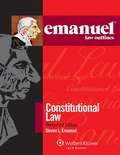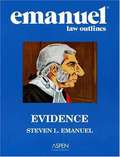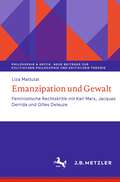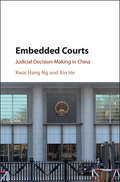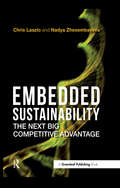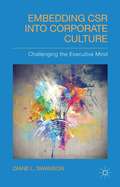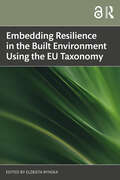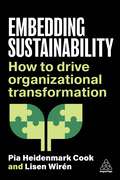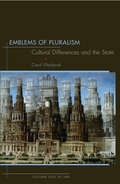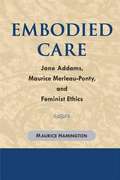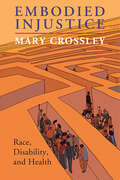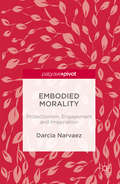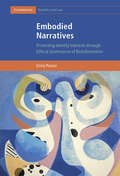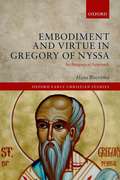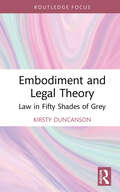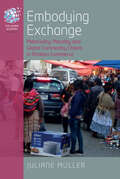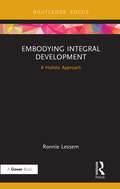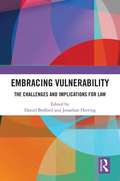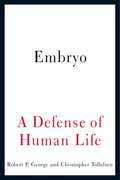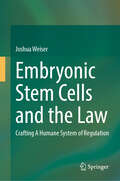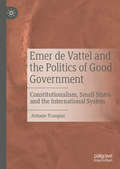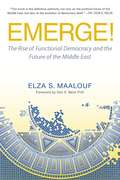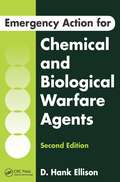- Table View
- List View
Emanuel Law Outlines: Constitutional Law (Thirty-First Edition)
by Steven EmanuelThe most trusted name in law school outlines, Emanuel Law Outlines support your class preparation, provide reference for your outline creation, and supply a comprehensive breakdown of topic matter for your entire study process. Created by Steven Emanuel, these course outlines have been relied on by generations of law students. Each title includes both capsule and detailed versions of the critical issues and key topics you must know to master the course. Also included are exam questions with model answers, an alpha-list of cases, and a cross reference table of cases for all of the leading casebooks. Emanuel Law Outline Features: #1 outline choice among law students Comprehensive review of all major topics Capsule summary of all topics Cross-reference table of cases Time-saving format Great for exam prep
Emanuel Law Outlines: Evidence, Fifth Edition
by Steven L. EmanuelRelied on by generations of law school students, Emanuel Law Outlines include detailed reviews of critical issues and key topics, short answer questions, Q&A's, and correlation charts referencing leading casebooks.
Emanzipation und Gewalt: Feministische Rechtskritik mit Karl Marx, Jacques Derrida und Gilles Deleuze (Philosophie & Kritik. Neue Beiträge zur politischen Philosophie und Kritischen Theorie)
by Liza MattutatSoziale Bewegungen stehen seit jeher in einem ambivalenten Verhältnis zum Recht. Einerseits versuchen sie oft, ihre Ansprüche als Rechte geltend zu machen, andererseits kritisieren sie die entpolitisierenden, gewaltsamen und repressiven Aspekte des Rechts. Liza Mattutat fragt deshalb, ob Rechtspolitiken möglich sind, die nicht nur die Inhalte des Rechts, sondern zugleich seine Form verändern. Dazu rekonstruiert sie die rechtskritischen Argumente von Karl Marx, Jacques Derrida und Gilles Deleuze und deutet mit ihnen zeitgenössische Auseinandersetzungen um die Ehe für alle, die Reform des Sexualstrafrechts und die Elternschaft von trans* Personen. Wo sind philosophische Rechtskritiken für die feministische Rechtspolitik einschlägig? Wo steht das bürgerliche Recht emanzipatorischen Bewegungen entgegen?
Embedded Courts: Judicial Decision-Making in China
by Ng Kwai Hang Xin HeEmbedded Courts is laden with tension. Chinese courts are organized as a singular and unified system yet grassroots courts in urban and rural regions differ greatly in the way they use the law and are as diverse as the populations they serve. Based on extensive fieldwork and in-depth interviews, this book offers a penetrating discussion of the operation of Chinese courts. It explains how Chinese judges rule and how the law is not the only script they follow - political, administrative, social and economic factors all influence verdicts. This landmark work will revise our understanding of the role of law in China - one that cannot be easily understood through the standard lens of judicial independence and separation of powers. Ng and He make clear the struggle facing frontline judges as they bridge the gap between a rule-based application of law and an instrumentalist view that prioritizes stability maintenance.
Embedded Sustainability: The Next Big Competitive Advantage
by Nadya Zhexembayeva Chris LaszloCompanies know how to meet the demands of shareholder value: years of managerial excellence testify to this achievement. Many also know how to create stakeholder value – through traditional approaches such as CSR and philanthropy which predictably lead to trade-offs and added costs. What remains elusive is discovering is how to meet both shareholder and stakeholder requirements in the core business – without mediocrity and without compromise – creating value for the company that cannot be disentangled from the value it creates for society and the environment. What if sustainability was embedded into the DNA of your organization? How can you incorporate environmental, health and social value into its very core? Many companies, despite their best intentions, "bolt on" sustainability as an afterthought to their core strategies. They trumpet green initiatives and social philanthropy which lie at the margins of the business, with symbolic wins that inadvertently highlight the unsustainability of the rest of their activities. Today's ecological and social pressures require a different business response – one that existing strategy frameworks fail adequately to address. In Embedded Sustainability, authors Chris Laszlo and Nadya Zhexembayeva explain and predict how companies can better leverage global challenges for enduring profit and sustained growth. They introduce the marquis concept of embedded sustainability: the incorporation of environmental, health, and social value into the heartbeat of the product life-cycle with no trade-off in price or quality – no social or green premium. This book helps readers to comprehend and implement the notion of embedded sustainability. At its best, embedded sustainability is invisible, similar to quality. In addition to delivering socially and environmentally conscious products for consumers, it is capable of considerably motivating employees. Most of all, it enables smart companies to create even more value for both their shareholders and stakeholders.
Embedding CSR into Corporate Culture
by Diane L. SwansonEmbedding CSR into Corporate Culture demonstrates that a new frontier for corporate social responsibility is possible in theory and practice. The key idea - discovery leadership - enables corporate managers to deal effectively with problems, issues, and value clashes occurring at the corporation-society interface.
Embedding Resilience in the Built Environment Using the EU Taxonomy
by Elzbieta RynskaTaxonomy is the common name for an EU regulation that supports companies in sustainable environmental and climate action (Regulation [EU] No. 2020/852). It is a classification tool designed for investors, companies, and financial institutions to define the environmental impact of business activities and the requirements that organisations must meet to be considered as sustainable.The aim of this book is to examine the EU taxonomy from the built environment perspective and the ways in which it can be used to build resilience in real estate. It presents the issues, hot points, and possible choices from the designers, construction consultants, and investing bodies' points of view, those who must set forth initial conditions, which should later become the keystones for greener developments. It brings together the expertise of a unique team of both researchers and professionals and presents a methodology, case studies, and solutions which together comprise a novel understanding of the taxonomy’s influence on the pre-construction phase. The book:• describes the role of the built environment within sustainable development and how real estate can be used to build resilience with the use of taxonomy.• describes the characteristics of resilient environmentally friendly cities in the future.• proposes a roadmap to demonstrate urban policies that promote decarbonisation; and•enables investors to compare their products, operations, and strategies in terms of sustainability.Overall, this book is essential reading for decision-makers in the public and private sectors, urban developers, space and spatial designers, architects, planners, community stakeholders, and real estate investors.Chapter 1 of this book is freely available as a downloadable Open Access PDF at http://www.taylorfrancis.com under a Creative Commons Attribution-Non Commercial-No Derivatives (CC-BY-NC-ND) 4.0 license.
Embedding Sustainability: How to Drive Organizational Transformation
by Pia Heidenmark Cook Lisen WirénEmbedding Sustainability is a practical, solutions-focused guide for sustainability managers and leaders to embed sustainability in organizations and drive improved performance.For organizations to truly embody sustainability, it must infuse all operations. Sustainability change agents need to be the conductors of the orchestra, making sure everyone has the same objective, is working with the same goals and is moving at the same pace. Embedding Sustainability charts the journey from purpose, scope and assessment to strategy, implementation and integration. It outlines the steps required to engage and commit employees to deliver to the same goals, creating a workplace where success is achieved through collective effort.Drawing on impressive experience, the authors share valuable tools and tips, lessons and coaching, factoring in different organizational maturity levels, international contexts and cultural differences and stakeholder mapping.It explores leadership principles, values, culture, strategies and engagement methods. Embedding Sustainability provides mid-senior sustainability professionals with guidance and encouragement to continue with their work and avoid common mistakes, while also prioritizing their own wellbeing. It will help sustainability change agents navigate the unique challenges of this role, find solutions to problems and maintain a positive outlook.
Embezzlement and High Treason Louis XIV's France: The Trial of Nicolas Fouquet
by Vincent J. PittsA look at life in the court of King Louis XIV, the politics of the time, and the trial of a man who knew too much for his own good.From 1661 to 1664, France was mesmerized by the arrest and trial of Nicolas Fouquet, the country’s superintendent of finance. Prosecuted on trumped-up charges of embezzlement, mismanagement of funds, and high treason, Fouquet managed to exonerate himself from all the major charges over the course of three long years, in the process embarrassing and infuriating Louis XIV. The young king overturned the court’s decision and sentenced Fouquet to lifelong imprisonment in a remote fortress in the Alps.A dramatic critique of absolute monarchy in pre-revolutionary France, Embezzlement and High Treason in Louis XIV’s France tells the gripping tale of an overly ambitious man who rose rapidly in the state hierarchy—then overreached. Vincent J. Pitts uses the trial as a lens through which to explore the inner workings of the court of Louis XIV, who rightly feared that Fouquet would expose the tawdry financial dealings of the king’s late mentor and prime minister, Cardinal Mazarin.“A compelling account of a political drama in mid-seventeenth century France, but it is also a window into the process by which rule of law gradually became established . . . [and] I thoroughly enjoyed reading it.” —EH.Net“Pitts’s book examines the show trial of Fouquet, and…the political process that created such an unfair outcome for a man who is often seen as one of the most well-known scapegoats in French history. Pitts has succeeded masterfully in weaving a powerful narrative that exposes convoluted corruption and mismanagement of ancient régime France.” —Renaissance Quarterly
Embezzlement and High Treason in Louis XIV's France: The Trial of Nicolas Fouquet
by Vincent J. PittsLouis XIV’s vendetta against his disgraced finance minister exposed dark truths about the state's finances.From 1661 to 1664, France was mesmerized by the arrest and trial of Nicolas Fouquet, the country’s superintendent of finance. Prosecuted on trumped-up charges of embezzlement, mismanagement of funds, and high treason, Fouquet managed to exonerate himself from all of the major charges over the course of three long years, in the process embarrassing and infuriating Louis XIV. The young king overturned the court’s decision and sentenced Fouquet to lifelong imprisonment in a remote fortress in the Alps.A dramatic critique of absolute monarchy in pre-revolutionary France, Embezzlement and High Treason in Louis XIV's France tells the gripping tale of an overly ambitious man who rose rapidly in the state hierarchy—then overreached. Vincent J. Pitts uses the trial as a lens through which to explore the inner workings of the court of Louis XIV, who rightly feared that Fouquet would expose the tawdry financial dealings of the king's late mentor and prime minister, Cardinal Mazarin.
Emblems of Pluralism: Cultural Differences and the State (The Cultural Lives of Law)
by Carol WeisbrodFrom outlawing polygamy and mandating public education to protecting the rights of minorities, the framing of group life by the state has been a subject of considerable interest and controversy throughout the history of the United States. The subject continues to be important in many countries. This book deals with state responses to cultural difference through the examination of a number of encounters between individuals, groups, and the state, in the United States and elsewhere. The book opens the concepts of groups and the state, arguing for the complexity of their relations and interpenetrations. Carol Weisbrod draws on richly diverse historical and cultural material to explore various structures that have been seen as appropriate for adjusting relations between states and internal groups. She considers the experience of the Mormons, the Amish, and Native Americans in the United States, the Mennonites in Germany, and the Jews in Russia to illustrate arrangements and accommodations in different times and places. The Minorities Treaties of the League of Nations, political federalism, religious exemptions, nonstate schools, and rules about adoption are among the mechanisms discussed that sustain cultural difference and create frameworks for group life, and, finally, individual life. At bottom, Emblems of Pluralism concerns not only relations between the state and groups, public and private, but also issues of identity and relations between the self and others.
Embodied Care: Jane Addams, Maurice Merleau-Ponty, and Feminist Ethics
by Maurice HamingtonUntil now, ethicists have said little about the body, limiting their comments on it to remarks made in passing or, at best, devoting a chapter to the subject. Embodied Care is the first work to argue for the body's centrality to care ethics, doing so by analyzing our corporeality at the phenomenological level. It develops the idea that our bodies are central to our morality, paying particular attention to the ways we come to care for one another. Hamington's argues that human bodies are "built to care"; as a result, embodiment must be recognized as a central factor in moral consideration. He takes the reader on an exciting journey from modern care ethics to Merleau-Ponty's philosophy of the body and then to Jane Addams's social activism and philosophy. The ideas in Embodied Care do not lead to yet another competing theory of morality; rather, they progress through theory and case studies to suggest that no theory of morality can be complete without a full consideration of the body.
Embodied Injustice: Race, Disability, and Health
by Mary CrossleyBlack people and people with disabilities in the United States are distinctively disadvantaged in their encounters with the health care system. These groups also share harsh histories of medical experimentation, eugenic sterilizations, and health care discrimination. Yet the similarities in inequities experienced by Black people and disabled people and the harms endured by people who are both Black and disabled have been largely unexplored. To fill this gap, Embodied Injustice uses an interdisciplinary approach, weaving health research with social science, critical approaches, and personal stories to portray the devastating effects of health injustice in America. Author Mary Crossley takes stock of the sometimes-vexed relationship between racial justice and disability rights advocates and interrogates how higher disability prevalence among Black Americans reflects unjust social structures. By suggesting reforms to advance health equity for disabled people, Black people, and disabled Black people, this book lays a crucial foundation for intersectional, cross-movement advocacy to advance health justice in America.
Embodied Morality
by Darcia NarvaezIn this book the broad, interdisciplinary theory of Triune Ethics Meta-theory is explored to demonstrate how it explains the different patterns of morality seen in the world today. It describes how human morality develops dynamically from experience in early life and it proposes that the methods in which humans are raised bring about tendencies towards self-protective or open-hearted social relations. When the life course follows evolutionary systems, then prosocial, open-hearted capacities develop but when the life course goes against evolutionary systems it should not be a surprise that self-focused values and behaviors develop such as violent tribalism, self aggrandizement and a binary orientation to others (dominance or submission). Many humans alive today exhibit impaired capacities in comparison to humans from small-band hunter-gatherer societies, the type of society that represents 99% of humanity's history. TEM is rooted in ethical naturalism and points out how to optimize human moral development through the lifespan--toward the ethics of engagement and communal imagination.
Embodied Narratives: Protecting Identity Interests through Ethical Governance of Bioinformation (Cambridge Bioethics and Law)
by Emily PostanIncreasing quantities of information about our health, bodies, and biological relationships are being generated by health technologies, research, and surveillance. This escalation presents challenges to us all when it comes to deciding how to manage this information and what should be disclosed to the very people it describes. This book establishes the ethical imperative to take seriously the potential impacts on our identities of encountering bioinformation about ourselves. Emily Postan argues that identity interests in accessing personal bioinformation are currently under-protected in law and often linked to problematic bio-essentialist assumptions. Drawing on a picture of identity constructed through embodied self-narratives, and examples of people's encounters with diverse kinds of information, Postan addresses these gaps. This book provides a robust account of the source, scope, and ethical significance of our identity-related interests in accessing – and not accessing – bioinformation about ourselves, and the need for disclosure practices to respond appropriately. This title is also available as Open Access on Cambridge Core.
Embodiment And Virtue In Gregory Of Nyssa: An Anagogical Approach (Oxford Early Christian Studies)
by Hans Boersma<P>Embodiment in the theology of Gregory of Nyssa is a much-debated topic. Hans Boersma argues that this - worldly realities of time and space, which include embodiment, are not the focus of Gregory's theology. Instead, embodiment plays a distinctly subordinate role. The key to his theology, Boersma suggests, is anagogy, going upward in order to participate in the life of God. <P>This book looks at a variety of topics connected to embodiment in Gregory's thought: time and space; allegory; gender, sexuality, and virginity; death and mourning; slavery, homelessness, and poverty; and the church as the body of Christ. In each instance, Boersma maintains, Gregory values embodiment only inasmuch as it enables us to go upward in the intellectual realm of the heavenly future. <P>Boersma suggests that for Gregory embodiment and virtue serve the anagogical pursuit of otherworldly realities. Countering recent trends in scholarship that highlight Gregory's appreciation of the goodness of creation, this book argues that Gregory looks at embodiment as a means for human beings to grow in virtue and so to participate in the divine life. <P>It is true that, as a Christian thinker, Gregory regards the creator-creature distinction as basic. But he also works with the distinction between spirit and matter. And Nyssen is convinced that in the hereafter the categories of time and space will disappear - while the human body will undergo an inconceivable transformation. This book, then, serves as a reminder of the profoundly otherworldly cast of Gregory's theology.
Embodiment and Legal Theory: Law in Fifty Shades of Grey
by Kirsty DuncansonThis book addresses the importance of the body in legal theory, through an analysis of the film Fifty Shades of Grey.As physical beings, we experience law in sensations of outrage when it is applied unethically, righteousness when it finds justice, and joy when it establishes partnerships in marriage. Our bodies feel and know law. In Embodiment and Legal Theory, it is argued that our bodies also theorise law. It is proposed that our bodies are involved in comprehending, negotiating, and reimagining the legal concepts that shape our lives. As a medium designed to engage us by stimulating our bodily reactions of tears, laughter, shock, and titillation, cinema provides an ideal site for exploring how bodies participate in legal arguments and the construction of legal meaning. For this reason, through a deep analysis of the film Fifty Shades of Grey (2015), this book presents a theory of embodied jurisprudence.At the intersection of legal theory and film studies, this book will appeal to students and scholars in both these areas, as well as in criminology and cultural studies.
Embodying Exchange: Materiality, Morality and Global Commodity Chains in Andean Commerce (The Human Economy #11)
by Juliane MüllerAddressing the infrastructural, legal and moral complexities in contemporary world trade, this book uses an ethnographic analysis of the interface of multinational brand manufacturers and popular traders in the Bolivian Andes. It offers a situated account of traders’ understanding of regulatory principles, and traces commercial dynamics beyond the limits of what we define as economic. It aims to humanize our understanding of the economy by grounding it in everyday life and morality.
Embodying Integral Development: A Holistic Approach (Transformation and Innovation)
by Ronnie LessemIn this fourth and final volume of the CARE-ing for Integral Development series, Ronnie Lessem integrates all that has come before in terms of: Community activation; Awakening integral consciousness; and institutionalized Research. Here he focuses on individual and community development alongside that of the organization or society, and sets it in the context of an integral economy. The four critical success factors identified in recognizing and releasing integral development aligned with CARE are: GROUNDING – linking up with and building upon existing local and global movements for socio-economic development; EMERGENCE – maintaining interconnected focus; NAVIGATING – locating and developing GENE-ius in a particular community/society; EFFECTING – committing to resolving an issue and identifying the most fertile development path. Embodying Integral Development offers a comprehensive system of accreditation. Supported by examples and illustrations of CARE, this book makes a case for Integral Development as a whole. It argues that it is a qualitative means of self-assessment rather than a quantitative one, focused on engagement, immersion and interpretation, as well as evaluation, rather than empirical verification.
Embracing Vulnerability: The Challenges and Implications for Law
by Jonathan Herring Daniel BedfordThis book brings together legal scholars engaging with vulnerability theory to explore the implications and challenges for law of understanding vulnerability as generative, and a source of connection and development. The book is structured into five sections that cover fields of law where there is already significant recourse to the concept of vulnerability. These sections include a main chapter by a legal theorist who has previously examined the creative potential of vulnerability and responses from scholars working in the same field. This is designed to draw out some of the central debates concerning how vulnerability is conceptualised in law. Several contributors highlight the need to re-focus on some of these more positive aspects of vulnerability in order to counter the way law is being used to mask that condition in order to enable more people to escape the stigma associated with it. They seek to explore how law might embrace vulnerability, rather than conceal it. The book also includes contributions that seek to bring vulnerability into a non-binary relationship with other core legal concepts, such as autonomy and dignity. Rather than discarding these legal concepts in favour of vulnerability, these contributions highlight how vulnerability can be entwined with relational autonomy and embodied dignity. This book is essential reading for both students studying legal theory and practitioners interested in vulnerability.
Embryo
by Robert P. George Christopher TollefsenGeorge (jurisprudence and American ideals and institutions, Princeton U. ) is a member of the President's Council on Bioethics, so readers who think that august body is benefiting the world may be interested to learn about the murk its house is built on. He and Tollefsen (philosophy, U. of South Carolina) clearly have no competence to discuss the biology of human development or the theology of life and death. That is just fine, however, because their argument is all about politics and power. Annotati...
Embryonic Stem Cells and the Law: Crafting A Humane System of Regulation
by Joshua WeiserThis book deals with the research and use of embryonic stem cells to combat a number of diseases and the legal limitations, arising mostly from bioethical concerns regarding human life. Using the New Haven problem and policy-oriented method of jurisprudence, the author thoroughly explains the scientific and technological parameters and promise of this medical innovation and its alternatives as well as the conflicting claims and past decisions regarding its legal and moral acceptability in international and comparative perspective. International law, EU and regional human rights law, as well as individual countries’ laws across the globe are covered, ending with American law on the federal and state levels. The book concludes with a recommendation of humane regulation, and a draft federal statute as a model form of regulation that would allow the beneficial research and use of this technology.
Emer de Vattel and the Politics of Good Government: Constitutionalism, Small States and the International System
by Antonio TrampusThis book explores the history of the international order in the eighteenth and nineteenth century through a new study of Emer de Vattel’s Droit des gens (1758). Drawing on unpublished sources from European archives and libraries, the book offers an in-depth account of the reception of Vattel’s chief work. Vattel’s focus on the myth of good government became a strong argument for republicanism, the survival of small states, drafting constitutions and reform projects and fighting everyday battles for freedom in different geographical, linguistic and social contexts. The book complicates the picture of Vattel’s enduring success and usefulness, showing too how the work was published and translated to criticize and denounce the dangerousness of these ideas. In doing so, it opens up new avenues of research beyond histories of international law, political and economic thought.
Emerge!
by Elza S. MaaloufIn the Middle East, turmoil has spread quickly. Oppression, inequality, and violence have been keyed in to the very makeup of its society. But what causes a culture to emerge and prosper or stagnate and fail? How can the people take charge of their own inalienable rights to growth, freedom, and life - to keep from backsliding into the grasp of old, unhealthy ideologies and meet their need for ascendance? In Elza Maalouf's groundbreaking new book Emerge! The Rise of Functional Democracy in the Middle East, we are introduced to a new paradigm for governance based on Clare Graves' theory of Spiral Dynamics. Maalouf, the founder of the Center for Human Emergence and the Build Palestine Initiative, is an expert on the application of Spiral Dynamics in the Middle East. By placing democracy in an evolutionary, values-system context that is specific to unique, Middle Eastern characteristics, Emerge pioneers the foundations for necessary change. Where the West's approach to conflict resolution has failed due to lack of memetic understanding, Maalouf's framework for decoding the complexities of the Middle East succeeds. By weaving together the threads that make up the pattern of each culture, Emerge shows the crucial role memes play in creating a system of governance that truly fits. Not only does Emerge ask us to seek understanding before we structure and create, it shows us the necessity of teaching our youth to build their own sustainable, indigenous constructs.
Emergency Action for Chemical and Biological Warfare Agents
by D. Hank EllisonEmergency Action for Chemical and Biological Warfare Agents, Second Edition is intended for the first responder to the scene of the release of a chemical or biological warfare agent. Formatted similarly to the Department of Transportation‘s Emergency Response Guidebook and designed as a companion to the author‘s Handbook of Chemical and Biological
